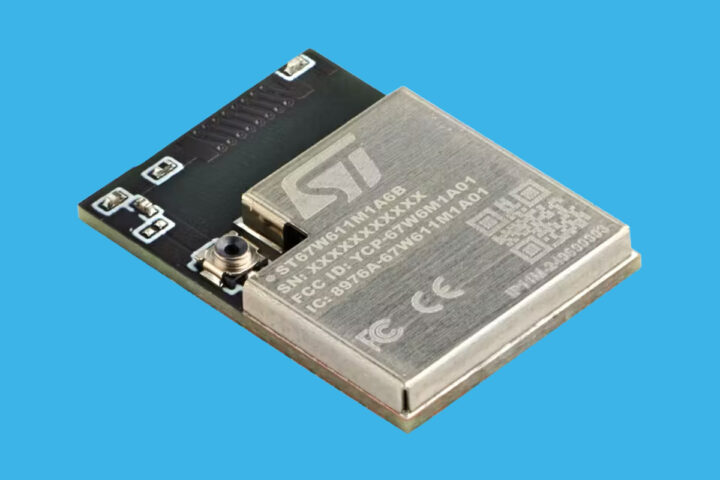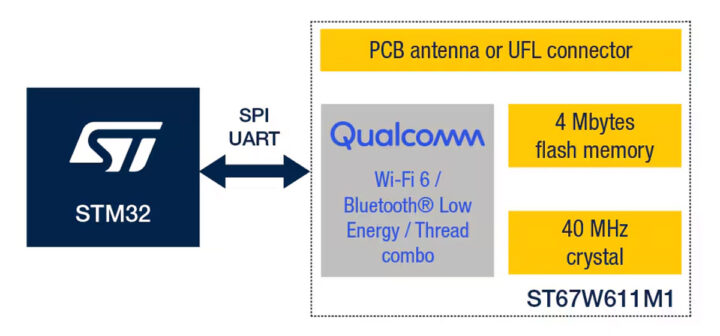ST Microelectronics has introduced the ST67W611M1 IoT module developed in partnership with Qualcomm and integrating the latter’s QCC743 multi-protocol connectivity chip with Wi-Fi 6, Bluetooth 5.3 Low Energy (BLE), Thread-compatible IEEE 802.15.4 connectivity, and support for Matter-over-Wi-Fi.
Additionally, it features 4MB of flash storage and provides options for a PCB or external antenna via a uFL connector. The module is designed to connect with STMicro’s STM32 microcontroller and microprocessor families through SPI and/or UART, making it easy to add wireless connectivity to STM32-based projects, including those using the new STM32N6 chips with an in-house Neural-ART machine learning accelerator. These features make this chip suitable for smart home devices, industrial IoT systems, wearables, healthcare monitors, and connected appliances.
ST67W611M1 specifications:
- Wireless Connectivity
- Wi-Fi 6 with up to 20 dBm output power
- Bluetooth Low Energy 5.3 with 2 Mbps throughput
- Thread support
- Supports Matter protocol over Wi-Fi for future-proof connectivity
- Storage – Embedded 4MB flash memory with OTA update capability
- Antenna – Integrated antenna or external antenna option
- Host Interfaces – SPI and UART
- Security
- Hardware cryptographic acceleration
- Security features including secure boot and secure debug
- PSA Certified Level One
- Power – Not Mentioned
- Dimensions – Not Mentioned
After going thoroughly through the available documentation, I couldn’t find critical information like power specifications and dimensions. Since the module relies on an AT Command set for control over SPI/UART, it should not be limited to STM32 hosts and other microcontrollers could be potentially supported.
In the same document the company mentions that there will be this X-NUCLEO-67W611M1 Nucleo expansion board that is designed to make the development process easier, but at the time of writing there is no documentation available and the company only provides a blurry image. Software support includes STM32CubeMX for code generation, the X-CUBE-ST67W61 package with Wi-Fi and Bluetooth drivers and examples, and STM32CubeIDE for development and debugging.
Previously we have written about various IoT modules with WiFi 6, BLE, and/or 802.15.4 including u-blox MAYA-W4 tri-radio IoT module, Silicon Labs SiWG917Y and SiWN917Y modules, the several Espressif ESP32-C6 IoT modules, and others, some of which can be used in standalone or hosted mode, but the ST67W611M1 only supports the latter.
STMicro says the ST67W611M1 IoT module is currently sampling, and the company expects mass production in early 2025. However, pricing details are yet to be made available. Additional information may be found on the STMicro website.
Debashis Das is a technical content writer and embedded engineer with over five years of experience in the industry. With expertise in Embedded C, PCB Design, and SEO optimization, he effectively blends difficult technical topics with clear communication
Support CNX Software! Donate via cryptocurrencies, become a Patron on Patreon, or purchase goods on Amazon or Aliexpress







